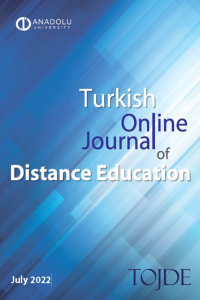Abstract
References
- Adnan, M., & Anwar, K. (2020). Online Learning amid the COVID-19 Pandemic: Students’ Perspectives. Online Submission, 2(1), 45-51.
- Alexander, B., Ashford-Rowe, K., Barajas-Murph, N., Dobbin, G., Knott, J., McCormack, M., ... & Weber, N. (2019). Important Developments in Educational Technology for Higher Education. Horizon report 2019 higher education edition, pp. 20-32 Retrieved from https://library.educause.edu/resources/2019/4/2019-horizon-report
- Armstrong, F. (2019). Social Constructivism and Action Research: Transforming teaching and learning through collaborative practice. Action Research for Inclusive Education, pp. 5-16. Oxfordshire, England: Routledge.
- Azlan, A. A., Hamzah, M. R., Sern, T. J., Ayub, S. H., & Mohamad, E. (2020). Public knowledge, attitudes and practices towards COVID-19: A cross-sectional study in Malaysia. Plos one, 15(5), DOI: https://doi.org/10.1371/journal.pone.0233668
- Bali, S., & Liu, M. C. (2018). Students’ perceptions toward online learning and face-to-face learning courses. Journal of Physics: Conference Series, 1108(1), pp. 012094. Retrieved from https://iopscience.iop.org/article/10.1088/1742-6596/1108/1/012094/meta
Abstract
The COVID-19 pandemic has accelerated the educational landscape of institutions of higher education, which were predominantly face-to-face. In Malaysia, many universities converted their courses into online courses to keep up with the challenges of working from home during the pandemic, using web technologies and blended learning approaches. However, there are challenges in ensuring students’ attention and retention rates are maintained and enough support and scaffolding are provided to them when they are learning online. As such, the MERLIN Project was undertaken to develop a virtual learning assistant that would provide online support to students outside of their online classes. The project used Artificial Intelligence (AI) technology with Natural Language Processing (NLP) features to develop a chatbot that simulated human-like conversation between chatbot and students. Content in the learning environment was media-rich and mapped to Mayer’s 12 Multimedia Learning Principles. Data from 102 students was collected to gauge their perceptions and feedback. Results showed that students found the chatbot to be helpful in their learning process and improved their understanding of the course material. A conceptual learning framework for the use of AI chatbots as learning assistants is proposed to improve students’ online learning experiences in the new normal.
References
- Adnan, M., & Anwar, K. (2020). Online Learning amid the COVID-19 Pandemic: Students’ Perspectives. Online Submission, 2(1), 45-51.
- Alexander, B., Ashford-Rowe, K., Barajas-Murph, N., Dobbin, G., Knott, J., McCormack, M., ... & Weber, N. (2019). Important Developments in Educational Technology for Higher Education. Horizon report 2019 higher education edition, pp. 20-32 Retrieved from https://library.educause.edu/resources/2019/4/2019-horizon-report
- Armstrong, F. (2019). Social Constructivism and Action Research: Transforming teaching and learning through collaborative practice. Action Research for Inclusive Education, pp. 5-16. Oxfordshire, England: Routledge.
- Azlan, A. A., Hamzah, M. R., Sern, T. J., Ayub, S. H., & Mohamad, E. (2020). Public knowledge, attitudes and practices towards COVID-19: A cross-sectional study in Malaysia. Plos one, 15(5), DOI: https://doi.org/10.1371/journal.pone.0233668
- Bali, S., & Liu, M. C. (2018). Students’ perceptions toward online learning and face-to-face learning courses. Journal of Physics: Conference Series, 1108(1), pp. 012094. Retrieved from https://iopscience.iop.org/article/10.1088/1742-6596/1108/1/012094/meta
Details
| Primary Language | English |
|---|---|
| Journal Section | Articles |
| Authors | |
| Publication Date | July 1, 2022 |
| Submission Date | September 20, 2021 |
| Published in Issue | Year 2022 Volume: 23 Issue: 3 |


